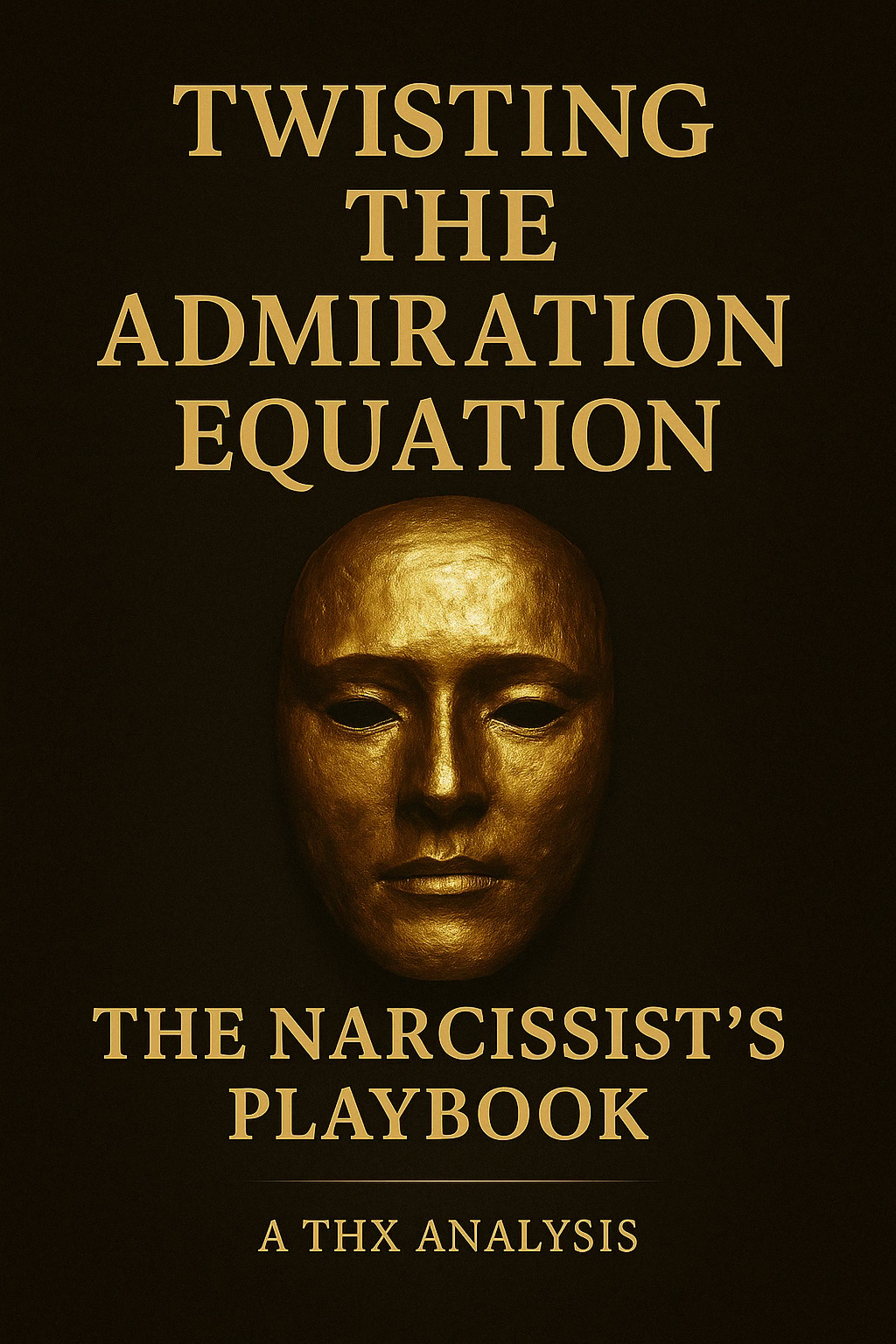Chapter 3: Twisting the Admiration Equation
From the THX Series Hub: The Narcissist’s Playbook & The Life After
Author’s Note
This post reflects personal experience and emotional pattern recognition. It’s not clinical advice.
If you’re healing from emotional manipulation, you may find this painful—but also clarifying.
There’s nothing wrong with admiring someone.
But no one should ever demand it.
How narcissists exploit the very emotions that build love and loyalty.
The Admiration Equation explains why we connect deeply to people we respect:
When someone shows Skill, Goodness, inspires Awe, or earns our Gratitude, we naturally want to trust them, follow them, even protect them.
But narcissists twist this equation.
They perform just enough of these traits to earn your admiration—then demand it, weaponize it, and punish you when it fades.
You’re not imagining it.
They didn’t just want to be admired.
They needed it to survive.
Admiration of Skill
My Experience:
She was competent. Strategic. Capable of organizing chaos. That drew me in. I admired her confidence—until I realized it was dominance.
She couldn’t handle when I succeeded. If I led, she criticized. If I stumbled, she exaggerated. I wasn’t allowed to be great—only grateful.
The Twist:
They showcase skill to gain power—then diminish yours to keep it.
The Takeaway:
Admiration of skill should inspire growth, not shrink your sense of self.
Admiration of Goodness
My Experience:
She told others she stayed in the relationship for me. That she sacrificed. That she was the one holding everything together.
Behind closed doors, she withheld affection, belittled my parenting, and dismissed my pain.
But in public? She was the saint.
The Twist:
They perform goodness, but don't practice it. The story matters more than the substance.
The Takeaway:
Goodness isn’t proven by suffering—it’s proven by how you treat people when no one’s watching.
Awe
My Experience:
She created awe with intensity. Grand gestures. Sudden insights. Love notes on the mirror, big plans, deep conversations.
It felt like fate. Like magic. Like finally being chosen.
But awe turned to confusion when nothing lasted. I kept chasing the version of her I met at the start. She never came back.
The Twist:
Awe becomes a weapon. They use emotional peak moments to reset the cycle—and to keep you hoping.
The Takeaway:
Real awe is sustainable and shared. If it disappears the moment you need something real, it was only a tactic.
Gratitude
My Experience:
I was always saying thank you—for things I didn’t ask for. She’d do something helpful, then bring it up for months. If I didn’t show enough appreciation, I was “ungrateful” or “spoiled.”
The gratitude wasn’t a gift. It was a leash.
The Twist:
They use gratitude to mask control. Every gesture becomes a debt.
The Takeaway:
If you’re afraid not to say thank you, it’s not generosity—it’s emotional accounting.
Final Words
The deepest human bonds are built on admiration.
But admiration should never be demanded. Or conditional. Or used to erase harm.
If someone inspires you to be better, that’s love.
If they shame you for not worshiping them, that’s control.
Narcissists don’t want to be loved.
They want to be believed—even when they lie.
They want to be admired—even when they harm.
But you don’t owe anyone your awe, your praise, or your loyalty—especially when you’ve already given them your truth.

Quick Links
Framework-based essays that decode the patterns, tactics, and predictable emotional logic of narcissistic behavior.
🔹 Chapter 1: The Illusion of Utility
Narcissists appear helpful, generous, and supportive—but what they offer isn’t true utility. This post unpacks how they simulate usefulness to create dependence, and how recognizing what was missing can be the first step toward freedom.
Using the lens of human flourishing, this piece explores how narcissists mimic love, meaning, and growth—not to connect, but to control. When every good thing gets twisted, how do you tell what’s real?
🔹 Chapter 3: Twisting the Admiration Equation
Admiration should feel earned, mutual, and expansive. But narcissists distort it into obligation. This post reveals how they manipulate skill, goodness, awe, and gratitude to extract loyalty—and punish doubt.
🔹 Chapter 4: When Admiration Becomes Worship
This entry shows what happens when admiration is no longer enough. Narcissists demand reverence, punish independence, and expect silence in the face of harm. Love is replaced by performance—and dissent becomes betrayal.
🔹 Chapter 5: Prospect Theory and Narcissism
Why do narcissists explode over small things? This post uses behavioral economics to explain how narcissists experience boundaries, autonomy, and truth as losses—and why they’ll do anything to avoid them.
🔹 Chapter 6: The Micro-Moment Manipulation
Sometimes what keeps us hooked isn’t the big promises—it’s the little moments. This piece explores how narcissists use micro-moments of affection and relief to reset your hope and obscure the harm.
🔹 Chapter 7: RKYC for Survivors
Originally designed as a business tool, “Really Know Your Customer” becomes a healing practice here. This post helps survivors rediscover their truth, needs, and voice—after years of emotional distortion.
A quiet offering for those who stayed too long, left too late, or are still trying to name what happened. This piece honors survivors, holds space for grief, and speaks to the person you used to be.
📖 Author’s Note & Series Closure
This final entry reflects on why the series was written, how the THX frameworks helped decode personal experience, and what it means to move forward—with clarity, dignity, and your story intact.



